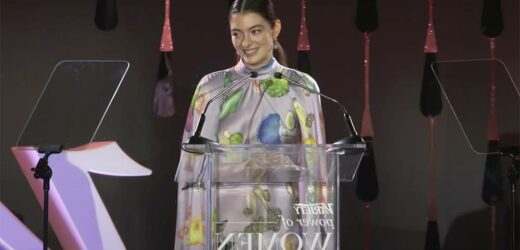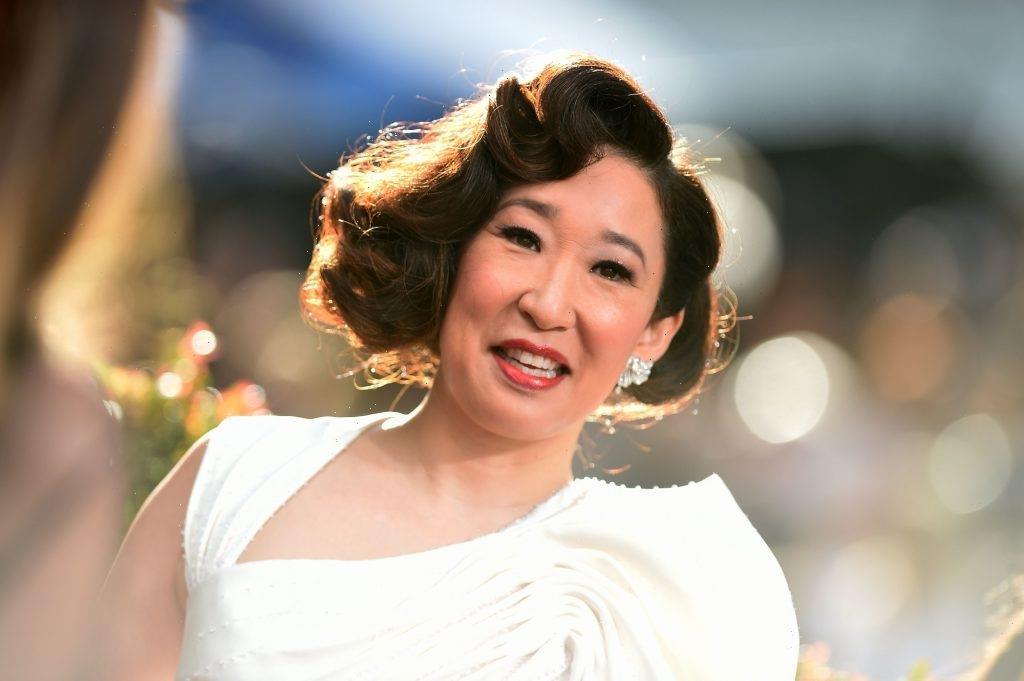Lorde was recognized at Variety‘s Power of Women event for her efforts on behalf of 350 Aotearoa, an organization “whose commitment to ending fossil fuel-driven projects back home is truly inspiring,” she commented.
Introduced by Hunter Schafer, the model, LGBTQ advocate and star of HBO’s “Euphoria,” who said: “In the past year, Lorde has used her powerful words, sounds, and presence to promote environmentalism and raise awareness about the growing issue of climate change. To so many of us young people, this is the crucial issue of our time. How can we protect our planet and make it a safe place not only for us to live, but for our children and their children? How can we make these changes in the face of lost time?”
Lorde then delivered a speech that was both reflective and future-looking, recalling how she rose to fame and what she’s doing with the “golden microphone” she was gifted to help better the world.
Lorde is not one to talk the talk without walking it, and she did just that when, for her latest album, “Solar Power,” she resisted a CD release, demonstrating her commitment to slowing the speed of climate change. In fact, the project is a sonic love letter to the natural world. As she says in her Power of Women cover story: “The purity of being outside was really magical to me,” Lorde says. “It felt like all the answers were out there, like I could be healed by the natural world.”
Read Lorde’s speech in its entirety below:
I’m sure many of you in this room came by your power in a way that felt serendipitous — right place, right time; a cocktail of privilege, skill and luck. You didn’t go looking for it, rather, it was something that happened to you. Maybe you’re familiar with my story — I was one of a million kids posting stuff online from their childhood bedroom, trying to impress their friends, when one day something crazy happened — I was handed a golden megaphone. This megaphone amplified my voice tenfold, so that it wasn’t just heard by the people I knew. All of a sudden journalists at major publications could hear my voice, still coming from my bedroom at the bottom of the world. Artists I’d looked up to for years, they could hear me. Hundreds of thousands of kids around the world, my megaphone worked on them. Enough people decided: what you’re saying is interesting, and we want to keep hearing you say it. At sixteen, I was given power. Eight years later, I’ve got enough social media followers to populate a small country. I was given a golden megaphone, and it’s here to stay.
Last month, I released a 5-song companion piece to my album Solar Power, sung in te reo Māori, the indigenous language of Aotearoa New Zealand. It was a hugely meaningful undertaking for myself and my collaborators — It felt right using my voice to support those who work to keep our beautiful indigenous language alive. This choice, to sing in te reo Māori, has been the subject of robust discourse — is this wealthy, famous white woman being supportive, or tokenistic? Is she advocating, or co-opting for her own social gain? Is it right to voice a language that isn’t yours, without ever having to experience the pain and struggle that historically came with speaking it? What does it mean when someone who’s never had to fight to be heard, to have their power acknowledged, stands alongside those who have, who do?
I welcome this discourse. Power like mine should be interrogated. In the past few years, we’ve all seen that no system of power is too big to fail, no person in charge too established to uproot. In having these conversations as a society, about what makes us feel alive or deadened, supported or suppressed, we move forward. And maybe it feels spicy when you’re the one whose power is being discussed in this way. But it’s not about you.
When we talk about power, about the amplification of a single voice, we must also acknowledge those who do not have such amplification. Tonight, I think of the women whose birth place or skin color or socioeconomic status was always going to make it less likely that they be handed a megaphone. Or the women who climate change will affect long before it affects me. People like me are elected — whether it’s by ballot, board vote, or Instagram like. Coming to terms with the fact that your power directly correlates with others’ lack is crucial for understanding and contextualizing what you’re capable of.
We must look at power this way in order to thoughtfully represent the people who decide every day that our voices matter.
I didn’t ask for the golden megaphone, not in so many words. But it’s in my hand now, and wielding it with care and context is the challenge I’m most pumped about these days. That’s why I was stoked to highlight an organization like 350 Aotearoa; not just because I support their campaign for fossil-free schools, but because one of their stated goals is to prioritize a partnership with Māori in all their climate-related decision making.
Be graceful with your power. Don’t grip it too tightly, or wield it unfairly. Be open to criticism and discussion of what you represent. It helps everyone move forward.
I’ll paraphrase the great Maggie Nelson here, “Power shape shifts and travels. Letting go of a calcified conviction of what and where power is and how it moves can be a crucial part of instigating its redistribution. Acknowledging and feeling what power we do have— not to mention analyzing our own will to it — invites us to investigate what we want to do.”
I know what I want to do with the megaphone in my hand, and I’ll do my best to take action accordingly. I invite, in fact I implore you—to hold me to it.
Source: Read Full Article


